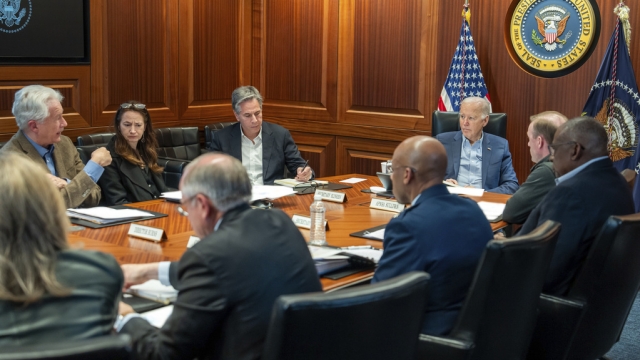U.S. President Joe Biden called a virtual meeting of the G-7 nations on Sunday, to coordinate, "a united diplomatic response" to Iran's attack on Israel.
As the attacks appeared imminent on Saturday, President Biden met with senior advisers in the situation room and returned to the White House after cutting his weekend trip to Delaware short.
In a phone call with Israeli Prime Minister Benjamin Netanyahu after the attacks, President Biden said the U.S. would not be participating in any potential Israeli counterattack on Iran and administration officials reiterated that point on Sunday.
"The President has been clear, we don't want to see this escalate," said National Security Council Spokesperson John Kirby on NBC's Meet the Press. "We don't want a wider war with Iran. The coming hours and days will tell us a lot."
In a statement after the attacks began, President Biden said, "I condemn these attacks in the strongest possible terms... Thanks to these deployments and the extraordinary skill of our servicemembers, we helped Israel take down nearly all of the incoming drones and missiles."
SEE MORE: Israel hails 'success' in blocking Iran's unprecedented attack
It wasn't just the U.S. military that helped Israel take down some of the incoming attack drones and missiles. On a call with reporters on Sunday, administration officials said it was a coalition effort involving other countries, including the U.K., France and Jordan.
As for American soldiers who are currently in the region, in a statement after the attacks, U.S. Secretary of Defense Lloyd Austin said, "Our forces remain postured to protect U.S. troops and partners in the region, provide further support for Israel's defense, and enhance regional stability…. We do not seek conflict with Iran, but we will not hesitate to act to protect our forces and support the defense of Israel."
Addressing Israelis on Sunday, Prime Minister Benjamin Netanyahu said they are prepared for whatever comes next
"Our defensive systems are deployed; we are ready for any scenario, both defensively and offensively," Prime Minister Netanyahu said. "The state of Israel is strong. The IDF [Israel Defense Forces] is strong. The public is strong."
All of it, though, stems from the wider issue of the Israel-Gaza war and an attack by Israel earlier this month on an Iranian consulate in Syria, which killed a dozen people – including commanders in Iran's Islamic Revolutionary Guard Corps.
So far, damage from Iran's retaliation appears to be minor, with one person injured.
On Sunday afternoon, the United Nations Security Council convened an emergency meeting at Israel's request. The UN's Secretary-General Antonio Guterres is calling for an immediate end to the hostilities, and reminded all member states that the UN Charter forbids the use of force against any state's territorial integrity or political independence.
"The Middle East is on the brink. The people of the region are confronting a real danger of a devastating full-scale conflict. Now is the time to defuse and de-escalate. Now is the time for maximum restraint," said Guterres.
Meanwhile, U.S. deputy ambassador Robert Wood reaffirmed Biden's administration's support for Israel's defense.
"In the coming days, and in consultation with other Member States, the United States will explore additional measures to hold Iran accountable here at the United Nations,” said Wood. "Let me be clear – if Iran or its proxies take actions against the United States or further action against Israel, Iran will be held responsible."
Trending stories at Scrippsnews.com





